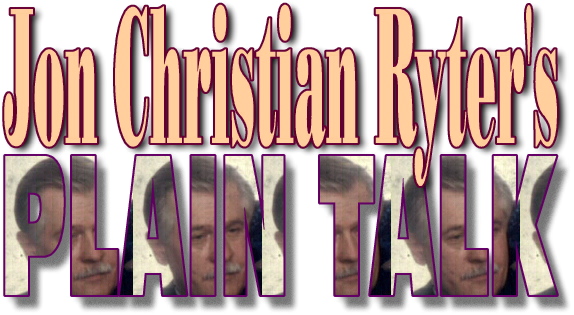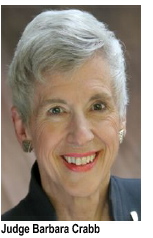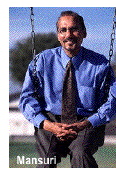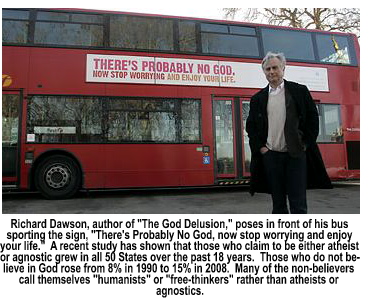
News
Behind the Headlines
Two-Cents Worth
Video of the Week
News Blurbs
Articles
Testimony
Bible Questions
Internet Articles (2015)
Internet Articles (2014)
Internet
Articles (2013)
Internet Articles (2012)
Internet Articles (2011)
Internet Articles (2010)
Internet Articles
(2009)
Internet Articles (2008)
Internet Articles (2007)
Internet Articles (2006)
Internet Articles (2005)
Internet Articles (2004)
Internet Articles (2003)
Internet Articles (2002)
Internet Articles (2001)


Killing
religious liberty 101: Carter-era social
progressive judge unconstitutionally rules the
National Day of Prayer is unconstitutional
Before we
cast "aspersions" on Jimmy Carter-appointed social progressive
Western District of Wisconsin US District Court Chief Judge Barbara
Crabb (who was a research assistant for the American Bar Association
with absolutely no judicial experience when she was picked for the federal
bench) for her own unconstitutional ruling on the National Day of Prayer,
let's double check what the Constitution says to see who is right.  It
appears we don't have to go very far, since the "wall of separation
between church and State" was legislated by the US Supreme Court
when they coupled the 1st Amendment with a personal letter written by
President Thomas Jefferson to the Baptist Association of Danbury
(Connecticut) in 1802, in Everson v Board of Education in 1947.
It
appears we don't have to go very far, since the "wall of separation
between church and State" was legislated by the US Supreme Court
when they coupled the 1st Amendment with a personal letter written by
President Thomas Jefferson to the Baptist Association of Danbury
(Connecticut) in 1802, in Everson v Board of Education in 1947.
In a letter to Jefferson from the Danbury Baptists after the election but before his inauguration the ministers wanted reassurances that the unconstitutional abrogation of religious liberty by former President John Adams who used his high office to promote the conversion of the Congregationalist Church in Massachusetts and Connecticut to Unitarianism would not continue during Jefferson's administration. The Danbury Baptists correctly viewed Adam's personal meddling in promoting Unitarianism as the government-sponsoring of a church, which violates the 1st Amendment. The Danbury Baptists wanted assurances from Jefferson that his administration would not continue the Adam's practice of promoting a "national religion."
While scores
of historians have written about Jefferson's letter to the Danbury
Baptists they never seemed to write about the reason for it. The media
also chose to ignore a more recent church and State intrusion that was
approved by the California State Board of Education during the Clinton
Era. The State of California leased office space to an Islamic Fountain
Valley businessman, Shabbir Mansuri. That office became the headquarters
for the Council on Islamic Education.  It
was from their Carden Hall Elementary School office where Mansuri
created his first US public school textbook about Islam, "Across
the Ages." What is most interesting about Mansuri's textbook
is that before textbook publisher Houghton-Miffin agreed to put
the book into print, they wanted assurances from Mansuri that the
textbook would withstand any court challenge since Houghton-Miffin
did not want to have to incur the expense of printing hundreds of thousands
of surreptitious Islamic-conversion textbooks that could not be sold to
the public school systems as social studies textbooks. How does an Islamic
political activist accomplish that? That's a debate for another day. Today's
question is why did the media ignore what was going on at Carden Hall?
Why
has the media ignored the attempt by government to create a national religion
through America's classrooms? And why have historians throughout the
ages ignored John Adam's attempt to do the same thing?
It
was from their Carden Hall Elementary School office where Mansuri
created his first US public school textbook about Islam, "Across
the Ages." What is most interesting about Mansuri's textbook
is that before textbook publisher Houghton-Miffin agreed to put
the book into print, they wanted assurances from Mansuri that the
textbook would withstand any court challenge since Houghton-Miffin
did not want to have to incur the expense of printing hundreds of thousands
of surreptitious Islamic-conversion textbooks that could not be sold to
the public school systems as social studies textbooks. How does an Islamic
political activist accomplish that? That's a debate for another day. Today's
question is why did the media ignore what was going on at Carden Hall?
Why
has the media ignored the attempt by government to create a national religion
through America's classrooms? And why have historians throughout the
ages ignored John Adam's attempt to do the same thing?
Taking pen in hand, Jefferson replied: "Believing with you that religion is a matter which lies solely between Man and his God, that he owes account to none other for his faith or his worship, that the legitimate powers of government reach actions only and not opinions, I contemplate with sovereign reverence that act of the whole American people which declared that their legislature should 'make no law respecting the establishment of religion, or prohibiting the free exercise thereof," thus building a wall of separation between Church and State." Wow. There it is. A wall of separation between Church and State. Jefferson's opinion. Private, personal correspondences of a president are not—I repeat, are not—codified law. Opinions aren't "law" in any way, shape or form. They are personal views. Nothing more, nothing less. And even when those views are expressed by a sitting president, they cannot be construed as utterances of law. I realize that, today, the American people think the President has the right to "create law" by writing Executive Orders, Presidential Proclamations and Presidential Decision Directives. He does not. The Executive Branch does not have lawmaking capabilities. Nor do agencies in the Executive Branch possess the constitutional power to assess fines. Making law is the function of the Legislative Branch, and assessing penalties is the sole prerogative of the Judicial Branch. When you are not good tutors of liberty freedom is easily lost.
It is important to understand that an Executive Order in government is precisely the same as a corporate CEO issuing a policy statement to his or her employees. An Executive Order is binding only on the employees in the Executive Branch. It is not binding on the Legislative Branch nor on the Judicial Branch—nor can it be construed by the federal courts as binding on the American people. If any federal judge rules that it is, that judge needs to be impeached and removed from the bench. If you recall on Aug. 10, 1997 when then President Bill Clinton issued an Executive Order banning smoking in all federal buildings, then House Speaker Newt Gingrich sent the President a curt reply advising Clinton that Executive Orders are nothing more than "interoffice memos" from the boss of the Executive Branch to his employees in the federal government. (Granted they are many.) Gingrich reminded Clinton that only the Legislative Branch has the constitutional authority to "write law," and only the Judicial Branch has the constitutional authority to adjudicate the laws written by the Legislative Branch. While Gingrich didn't speak it, his words implied that Clinton's job was to make sure the paperwork was filed, the floors were swept and mopped, and that someone turned out the lights when the real workers went home for the evening. Clinton never argued the point. And Gingrich sat in the Speaker's Office, feet up on his desk, and lit up an expensive never-used-by-the-president cigar, and enjoyed the smoke. (And Newt was a non-smokers—except perhaps an occasional cigar like Clinton who was known to enjoy a good cigar before, during and after sex.)
Every member of the Truman-era, New Deal Supreme Court that voted in favor of the decision to give Jefferson's personal letter to the Baptist Association of Danbury the force of constitutional law needed to be impeached and removed from office. They weren't because the American people believed the high court had the legal authority to make that decision. Under the separation of power clauses in the Constitution, here's how it works. The Executive Branch is the administrative branch of government. The Executive Branch carries the water pail for the States. The Executive Branch has no constitutional authority to make either legislative or judicial decisions. The Judicial Branch has no administrative or legislative power. Their sole job is to interpret the laws as written by the Legislative Branch and to render decisions based on what those laws say—not what five Justices think they should have said when they were legislated by rewriting those laws by the coupling of unrelated laws to create a brand new law. The Legislative Branch has no Executive authority nor do they have any judicial authority. Yet, Congress has no trouble finding witnesses it calls guilty of "contempt of Congress" and jailing them. And, the IRS, an Executive Branch agency, has no problem with hauling US citizens before IRS courts in which the judges are IRS officials in the most arbitrarily biased courts in the land. And, as already noted, the Judicial Branch had no problem in 1947 coupling the 1st Amendment with a personal letter and legislating a law which the 1st Amendment bars them from doing. I guess the courts felt because the 1st amendment only admonished Congress from "...making no laws respecting the establishment of a religion, or prohibiting the free exercise thereof, " that they could do it because the 1st Amendment did not specifically restrict them from doing so. Of course, since they did not give the courts legislative authority, the Founding Fathers found no need to restrict them from doing something they had no authority to do.
In bluntly spoken words, judges can't constitutionally couple clauses of the Constitution with personal letters and come up with new law designed to suit the social progressives from 1933-1952 who were attempting to erase the Constitution pretty much the same way the latest social progressive, Barack Hussein Obama, is doing today. Not even if a letter is written by a popular "Founding" president is used to suggest that the Founding Fathers intended that there be a wall of separation so rigid that the government of the most Christian nation on Earth could not designate that there should be a National Day or Prayer, or that Christian school children cannot wear a crucifix necklace to school while Muslim children can lay down their prayer rug in the classrooms of America's schools and pray to Allah twice a day. Something is definitely wrong in Sodom on the Potomac.
What it amounts to is that the socialist FDR high court arrogantly displayed their willingness to legislate from the bench and, in doing so, literally changed the the nature religious freedom under the 1st Amendment, making religious liberty conditional rather than inherent—following the model established by the UN Covenant on Human Rights. In Everson, they did two things. First, by coupling the 1st Amendment with the 14th Amendment, they applied restrictions specifically leveled against the federal government by the Founding Fathers against the States. Second, it flipflopped the 1st Amendment by creating a "wall of separation" between the church and any entity loosely construed to have any association with government at any level, and by extension, any citizen practicing the free exercise of his or her religious faith in any federal, state, county or municipal building or vacant lot—providing that citizen is a Christian. (Social progressive federal judges have been tutored during seminars sponsored by the World Court on how to dilute the United States Constitution and, in particular, the Bill of Rights, by coupling the 1st Amendment with the International Covenant on Civil & Political Rights—particularly Article 18 § 3 which states "...[f]reedom to manifest one's religion or beliefs may be subject to only to such limitations asa are prescribed by law and are necessary to protect public safety, order, health, or morals or the fundamental rights and freedoms of others." The problem here is twofold. First, the Constituiton cannot be amended by juryrigging by federal magistrations who do not have the right to legislate. And, second, the 1st Amendment makes itself clear that it cannot be amended since no body within the government heirarchy of the United States can create any law that infringes on the right of the people to worship God as they see fit—not as those who disagree with their religious beliefs see fit.
Since the right of free speech and our right to worship where, when, and as we please, are inherent under the Bill of Rights, the globalists who need to abolish our right to breathe free air in order to achieve globalization, found if they could couple the Bill of Rights with the conditional rights of speech and religion found in the UN Covenant on Human Rights, they could successfully thwart religious liberty since 1947 in Everson v Board of Education and McCollum v Board of Education in 1948. (At the end of World War II, the globalists believed that World Government would be reality by 1950 after President Harry S. Truman introduced UN globalist Sir Julian Huxley's UNESCO programs to US schools in 1946.
Why would any US president attempt to surrender our sovereignty to a world government when our forefathers fought and died to escape the bondage of European masters? Because, in every nation in the world, the usurpers attempting to dilute national sovereignty and merge their nation with a pool of foreign nations who have distinctly different political ideologies and an inane hatred of Americans learned that national patriotism and pride are inexplicably linked to the religious roots of the nation. Too destroy patriotism it is first necessary to destroy God.
Okay...back to the 1st Amendment. Don't yawn while you're reading it, or you'll miss it. The part dealing with religion contains only 16 words. Frankly, it just isn't complicated enough to trip up a lawyer or a judge—or a Congressman or Senator who can trip over their own tongues when they try to talk and think at the same time. Here it is: "Congress shall make no law respecting an establishment of religion, or prohibiting the free exercise thereof..." Let's break it down in baby steps for the lawyers. What the first ten words are saying is that government can't establish a State religion. That means, they can't force children, whether Christian, Jew, Buddhist, Hindi, atheist or what not, to role play as Muslims, dressed up in Islamic costumes and quote scripture from the Koran (Qu'ram)—and pretend it's social studies when its hardcore religion.
While they are prohibiting Christian children from wearing T-shirts or Christian or Jewish jewelry, the public school systems allow Muslim students to wear Islamic garb, carry the Koran, and take prayer breaks during the day. Lawyers and judges have flipflopped the 1st Amendment. First, the prohibitions in the Constitution ban only the government, not the People, from establishing a religion. Religion is a "people's choice reward."
In fact, the Constitution
admonishes the State from doing anything to interfere with the right of
the people to practice their religion whenever and wherever they like.
That's what "...or prohibiting the free exercise thereof"
means.  If
I want to stand up in the middle of a high school commencement and thank
God for getting me through 12 years of social progressive brainwashing
and still have a functional brain, I should be allowed to thank God for
that. If I, as a public school teacher, want to wear a crucifix lapel
pin, or bring my favorite Bible to read during lunch hour, the Constitution
guarantees me that right because I am not the State. I am one of "we
the people."
If
I want to stand up in the middle of a high school commencement and thank
God for getting me through 12 years of social progressive brainwashing
and still have a functional brain, I should be allowed to thank God for
that. If I, as a public school teacher, want to wear a crucifix lapel
pin, or bring my favorite Bible to read during lunch hour, the Constitution
guarantees me that right because I am not the State. I am one of "we
the people."
Yet, the social progressives who are weaving Article 13 of the Covenant on Human Rights into the first sentence of the 1st Amendment, are amending the Bill of Rights by legislating from the bench. It is a prerogative they do not possess.
Article 13 of the Covenant on Human Rights says: the "...freedom to manifest one's religion or belief may be subject only to such limitations that are prescribed by law." By coupling the first 16 words of the 1st Amendment with the last eighteen words of the UN Covenant on Human Rights, government has converted an inherent liberty into a conditional right. "Congress shall make no laws prohibiting the free manifestation of one's religion or belief which may be subject only to such limitations that are prescribed by law." Now, does that sound more like the 1st Amendment you've seen in practice for the last three decades? Religious liberty is now a conditional right based on the whims of the social progressives who are largely atheists, or who believe God is a superstition and that one god is as god as the next.
On April 15 social progressive Judge Crabb, in a ruling in which she said "...the government can no more enact laws supporting a day of prayer than it can encourage citizens to fast during Ramadan, attend a synagogue or practice magic," declared the National Day of Prayer unconstitutional. Crabb said the National Day of Prayer proclamation crossed the line, adding if there can be a "day of prayer," then there can also be a "day of blasphemy." In her summary, she said "...it is because the nature of prayer is so personal and can have such a powerful affect on a community that government may not use its authority to try to influence an individual's decision whether and when to pray." Crabb added that her ruling was not a judgment on the value of prayer. She said the government's involvement in prayer may be constitutional if the conduct serves a "significant secular proposal," and did not amount to a call for "religious action." But, she added, "It goes beyond mere 'acknowledgment' of religion because its sole purpose is to encourage all citizens to engage in prayer, an inherently religious exercise that serves no secular function..."
The Freedom From Religion Foundation filed the lawsuit in 2008 largely because of Bush-43's ties with the Christian right, arguing that a public decree to pray violated the separation of church and state (which by the way, is not a constitutional precept, but was a comment in a letter from Thomas Jefferson to a pastor friend in answer to a question posed by the pastor about state religions.)
In point of fact, what
is unconstitutional was not designating a day of prayer, but Crabb's ruling
since the 1st Amendment minus the coupling of Article 13 of UN Covenant
on Human Rights by liberal judges to make an inherent right a conditional
one, mandates that no lawmaker (which includes judges who legislate from
the bench) has the authority to interfere, in any way, with the inherent
right of the people to worship whomever they wish, whenever they wish,
and wherever they wish to practice their religious faith. The right to
free speech and to worship God as you please are the most basic liberties
in the Constitution.  Those
two "rights" are so sacrosanct that when they were penned, the
Founding Fathers added an addendum to protect them by prohibiting lawmakers
from abridging either right by writing laws to restrict those liberties.
No other right under the Bill of Rights carrying a warning to Congress
not to attempt to alter them.
Those
two "rights" are so sacrosanct that when they were penned, the
Founding Fathers added an addendum to protect them by prohibiting lawmakers
from abridging either right by writing laws to restrict those liberties.
No other right under the Bill of Rights carrying a warning to Congress
not to attempt to alter them.
Jay Sekulow of the American Center for Law and Justice, who filed a friend-of-the-court brief supporting 31 members of Congress who oppose Crabb's decision, said: "It's unfortunate that this court failed to understand that a day set aside for prayer in this country represents a time-honored tradition that embraces the First Amendment, not violates it."
The National Day of Prayer was created by an act of Congress in 1952 when Congress enacted a law which required the President to proclaim one day each year as a "national day of prayer." In 1988, the law was amended designating the first Thursday in May as the National Day of Prayer. It should be noted that the law was initially enacted by a Democratic Congress in 1952 (the Republicans took control of both Houses in Jan., 1953), and it was amended by a Democratically-control in 1988. So, the far left cannot claim that the National Day of Prayer was crammed down the throats of the American people by Christian fundamentalists.
Julaine Appling, president of Wisconsin Family Action, Inc., which promotes and supports Judeo-Christian principles and values said Judge Crabb's remarks comparing the Day of Prayer to Ramadan and other religions including witchcraft, was far-fetched. "This nation," she said in her own press conference, "was founded on Judeo-Christian principles and values, and that's why it's appropriate for the tradition to continue. We were not founded according to Muslim law. We were not founded according to Muslim religion. Muslims were not the Founding Fathers of our nation."

Copyright © 2009 Jon Christian Ryter.
All rights reserved.


